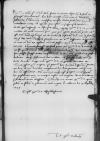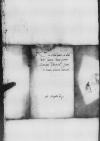Reverendissimo in Christo Patri et Domino, domino ⌊Ioanni⌋ Dei gratia episcopo Varmiensi, fratri et maiori plurimum observando
Hac hora reverso nuntio meo cum litteris dominorum ⌊palatinorum⌋ et ⌊Thorunensium⌋ confestim consedi ad has scribendas, ne quid intercideret morae ad agenda, quae restant in suspensione comiciorum. Mitto igitur responsa et consensus illorum rogoque, Reverendissima Dominatio Vestra non gravetur mittere ad aulam nuntium suum, per quem aperte scribendum puto non esse tutum ⌊dominis consiliariis⌋, ut conveniant ad constitutum diem nec id futurum, ne, si hoc iterum indulgeri precabimur, ut videlicet differatur conventus, cum ante eum diem vix expediri nuntius possit, iterum dicamur post festum venire. Conveniet fortasse ut petat etiam Reverendissima Dominatio Vestra de rationibus accisae, quod monet dominus ⌊palatinus Marieburgensis⌋. Qua ratione id fieri possit, scripsi antea consilium meum sacrae ⌊regiae maiestati⌋, quod tum probabatur. Mihi festinanti has mittere, non superfuit otium scribendi ad aulam. Rogo autem, Reverendissima Dominatio Vestra non gravetur admittere, ut nuntius Ipsius, quem missura est, parvum hoc itineris dispendium faciat, ut ⌊huc⌋ ad me divertat, accepturus hic litteras paratas, etiam si me hic non offenderit. Nam animus mihi est propter invalescentem hic pestilentiae vim in ⌊Antiquum Castrum⌋ me recipere, donec dominus Deus salubriorem auram concesserit. Commendo me amori Reverendissimae Dominationis Vestrae, quam salvam et felicem in plurimam aetatem cupio.

